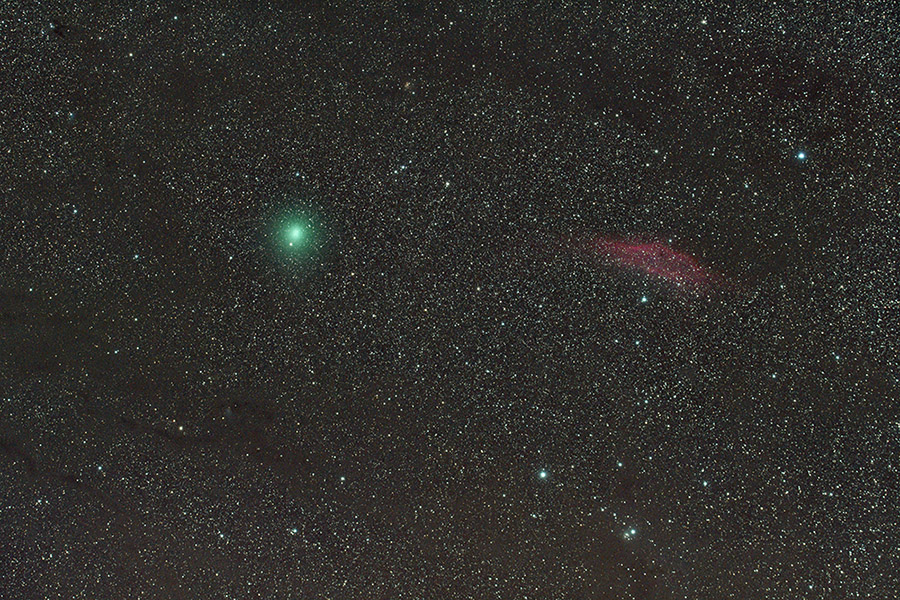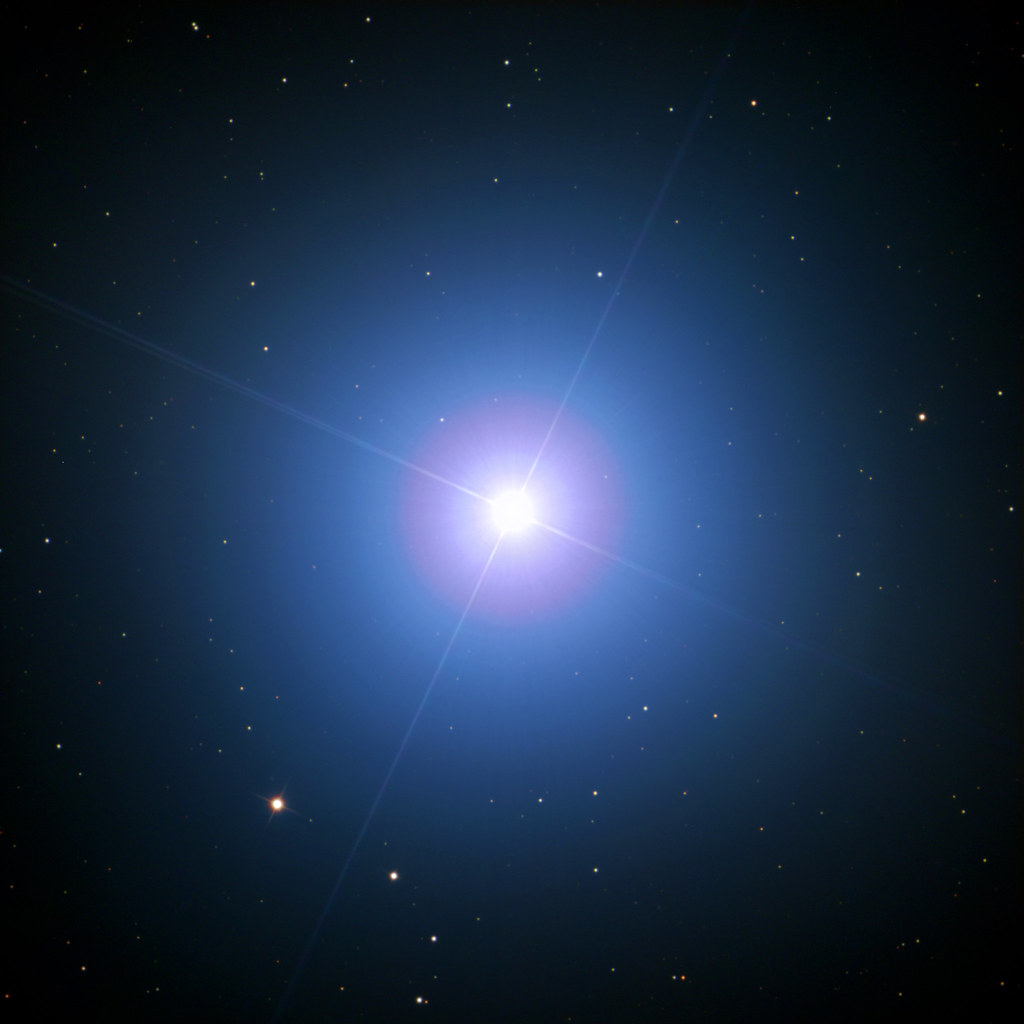Submission: 2018 December
-
Efrem Frigeni
- Ensign
- Posts: 30
- Joined: Wed Jul 13, 2016 2:39 pm
Re: Submission: 2018 December
Dust in M78
From Bergamo (Italy)
Copyright: Efrem Frigeni
From Bergamo (Italy)
Copyright: Efrem Frigeni
mail to : efrem.frigeni@gmail.com
Re: Submission: 2018 December
Two tails of 46P/Wirtanen
Copyright: Steed Yu & NightChina.net
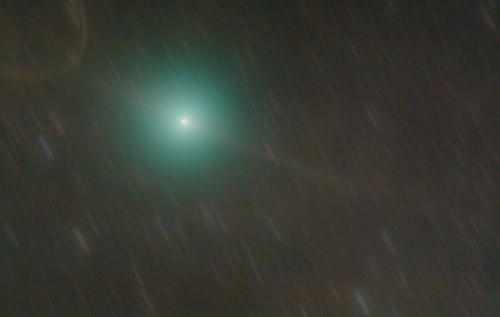 two tails of comet 46P by 虞 骏, on Flickr
two tails of comet 46P by 虞 骏, on Flickr
On the night of December 14, I used a telescope to track Comet 46P/Wirtanen. In this photo with a cumulative exposure time of 100 minutes, you can see two long tails pulled from the both side of the coma. The one on the right is the normal tail opposite the direction of the sun. The one on the left should be a rare antitail.
The halo in the upper left corner should be the glare in the telescope, not the real structure.
Copyright: Steed Yu & NightChina.net
 two tails of comet 46P by 虞 骏, on Flickr
two tails of comet 46P by 虞 骏, on FlickrOn the night of December 14, I used a telescope to track Comet 46P/Wirtanen. In this photo with a cumulative exposure time of 100 minutes, you can see two long tails pulled from the both side of the coma. The one on the right is the normal tail opposite the direction of the sun. The one on the left should be a rare antitail.
The halo in the upper left corner should be the glare in the telescope, not the real structure.
-
jjimenezpp
- Ensign
- Posts: 23
- Joined: Mon Dec 17, 2018 10:51 am
Re: Submission: 2018 December
Via Lactea desde Llanos de Jable con la cascada de nubes a la izquierda y el volcan Birigoyo a la derecha
Realizada desde Llanos de Jable en La Palma – 12 Junio 2018
Equipo utilizado :
-Objetivo Sigma Art 35mm f/1.4
-Tripode Manfrotto 090
-Canon 6D mod
Tomas:
-Panoramica realizada con 20 tomas en horizontal de 13” cada una, a ISO 3200 y F1.4
Procesado:
Panorama montado con Autopano Giga procesado con Pixinsight, retoques finales con Lightroom y Adobe Photoshop
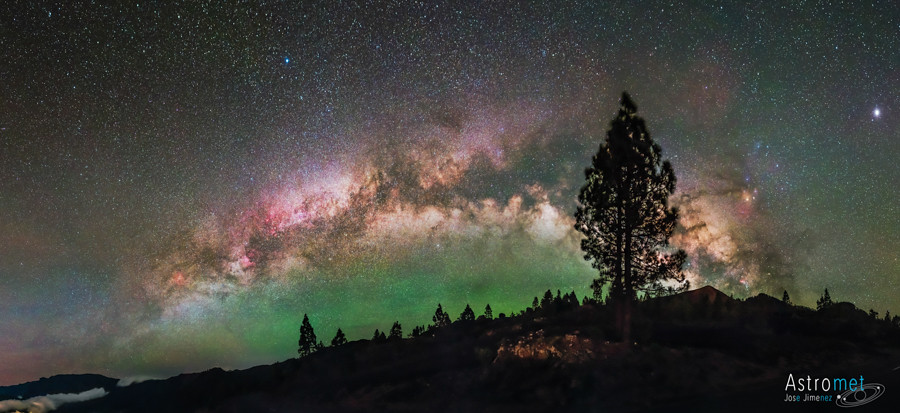
El arbol de las brujas by José Jiménez, en Flickr
Realizada desde Llanos de Jable en La Palma – 12 Junio 2018
Equipo utilizado :
-Objetivo Sigma Art 35mm f/1.4
-Tripode Manfrotto 090
-Canon 6D mod
Tomas:
-Panoramica realizada con 20 tomas en horizontal de 13” cada una, a ISO 3200 y F1.4
Procesado:
Panorama montado con Autopano Giga procesado con Pixinsight, retoques finales con Lightroom y Adobe Photoshop

El arbol de las brujas by José Jiménez, en Flickr
Re: Submission: 2018 December
Re: Submission: 2018 December
-
barretosmed
- Science Officer
- Posts: 486
- Joined: Thu Oct 12, 2017 6:04 pm
Re: Submission: 2018 December
46P / Wirtanen in 3D representation
46P / Wirtanen in 3D representation
I kindly ask your friends to access the link: to view the image completely. https://www.astrobin.com/full/381842/0/
In this image I made a 3D reproduction on the computer to show what the inside of the comet would be on the left side, using the interior to demonstrate the relief in bright parts, with the center as the highest point of light. On the right side I did inversion technique as if the center were the darkest part.
Comets are cosmic snowballs of frozen gases, rocks, and dust that orbit the Sun. When a comet's orbit approaches the Sun, it warms up and repels dust and gasses in a giant bright head, larger than most planets . Dust and gases form a tail that moves away from the Sun for millions of miles. Its diameter is estimated at 1.2 km.
Some argue for electrochemical theory that comets, are formed by instance Sio2. Si and o2 are electrically separated, and each oxygen atom is first combined with one hydrogen atom to form the hydroxyl radical, another hydrogen atom to form water. Comets are neglected crystalline rocks. Much of what comets are made can not form in the cold darkness of space.
Best resolution:
https://www.astrobin.com/full/381842/0/
Equipment and technology:
Smarteq mount without guide
Canon 6D modified
Lens 200mm f2.8
15 x 60 sec + 130 calibration frames
Programs: Sharpcap. APT, Photoshop, Pixinsight, Photoscape, Fitswork
Jales - SP - Brazil.
December 15, 2018
Copyright: Fernando Oliveira de Menezes
46P / Wirtanen in 3D representation
I kindly ask your friends to access the link: to view the image completely. https://www.astrobin.com/full/381842/0/
In this image I made a 3D reproduction on the computer to show what the inside of the comet would be on the left side, using the interior to demonstrate the relief in bright parts, with the center as the highest point of light. On the right side I did inversion technique as if the center were the darkest part.
Comets are cosmic snowballs of frozen gases, rocks, and dust that orbit the Sun. When a comet's orbit approaches the Sun, it warms up and repels dust and gasses in a giant bright head, larger than most planets . Dust and gases form a tail that moves away from the Sun for millions of miles. Its diameter is estimated at 1.2 km.
Some argue for electrochemical theory that comets, are formed by instance Sio2. Si and o2 are electrically separated, and each oxygen atom is first combined with one hydrogen atom to form the hydroxyl radical, another hydrogen atom to form water. Comets are neglected crystalline rocks. Much of what comets are made can not form in the cold darkness of space.
Best resolution:
https://www.astrobin.com/full/381842/0/
Equipment and technology:
Smarteq mount without guide
Canon 6D modified
Lens 200mm f2.8
15 x 60 sec + 130 calibration frames
Programs: Sharpcap. APT, Photoshop, Pixinsight, Photoscape, Fitswork
Jales - SP - Brazil.
December 15, 2018
Copyright: Fernando Oliveira de Menezes
Re: Submission: 2018 December
Thomas Henne, I must tell you how much I love this image and your other one, the one showing us NGC 654, NGC 663 and vdB 6.tommy_h wrote: ↑Wed Dec 19, 2018 1:13 pm LDN 1188 and LBN 496
http://www.distant-lights.at/lbn496-2018_10_4.htm
Copyright: Thomas Henne
Both of your images are splendid examples of "cosmic landscape painting". It is not one object that is in focus, but an entire skyscape, full of stars, clusters and nebulas. The composition and details are splendid and the colors are superb.
Thank you!
Ann
P.S. Can you tell me the designation of the star at lower left that appears to be surrounded by an emission nebula? Or, alternatively, can you tell me the designation of the bright and blue star to the upper right of this apparent emission nebula? There appears to be a star surrounded by a dust-reddened reflection nebula to the lower right of the blue star.
Color Commentator
Re: Submission: 2018 December
Thank you, Ann!
I'm glad, that you like this images. The star at lower left, that seems to be surrounded by an emission nebula is BD+60 2380 or TYC 4264-678-1.
The dust-reddened reflection nebula is GN 22.14.9 or DG 181.
Here is an annotated image (it's also on my website): Best Regards
Thomas
I'm glad, that you like this images. The star at lower left, that seems to be surrounded by an emission nebula is BD+60 2380 or TYC 4264-678-1.
The dust-reddened reflection nebula is GN 22.14.9 or DG 181.
Here is an annotated image (it's also on my website): Best Regards
Thomas
Re: Submission: 2018 December
Thanks! I asked, because I'm interested in hot stars. Thanks to you, I could use Simbad Astronomical Database to find out more about the star that appears to be surrounded by an emission nebula. According to Simbad, its spectral class is B2III, which means it is just hot enough to ionize a faint emission nebula.tommy_h wrote: ↑Thu Dec 20, 2018 6:00 am Thank you, Ann!
I'm glad, that you like this images. The star at lower left, that seems to be surrounded by an emission nebula is BD+60 2380 or TYC 4264-678-1.
The dust-reddened reflection nebula is GN 22.14.9 or DG 181.
Here is an annotated image (it's also on my website): Best Regards
Thomas
Thanks again!
Ann
Color Commentator
IC1396 and Garnet Star
Hello,
A four tiles mosaic, 1 hour 30 of SHO with my ASA10
The full 53 Mpx is here: https://www.astrobin.com/full/356197/B/?nc=user
A four tiles mosaic, 1 hour 30 of SHO with my ASA10
The full 53 Mpx is here: https://www.astrobin.com/full/356197/B/?nc=user
-
Václav Hýža
- Ensign
- Posts: 27
- Joined: Thu Jun 22, 2017 3:18 pm
- Location: Czech Republic
- Contact:
Re: Submission: 2018 December
location: Jeseníky Mountains in the Czech republic.
in the picture is: Comet 46P and NGC 1499 California.
date: 19.12.2018
Processing Information: 55 frames, ISO 12800, f / 3.5, 50 + 45 x DF.
original size http://www.vaclavhyza.cz/galerie/46p%20apod.jpg
in the picture is: Comet 46P and NGC 1499 California.
date: 19.12.2018
Processing Information: 55 frames, ISO 12800, f / 3.5, 50 + 45 x DF.
original size http://www.vaclavhyza.cz/galerie/46p%20apod.jpg
-
Sebastian Voltmer
- Ensign
- Posts: 67
- Joined: Tue Jan 17, 2012 11:45 pm
Re: Submission: 2018 December
Deep image of Comet 46P / Wirtanen
Dec 13, 2018
Larson-Sekanina processing with PixInsight
79 x 30 s (ISO 400) with Sony a7s (a), Celestron 11 EdgeHD, Hyperstar mode. Baader UV/IR cut 2" filter
Spicheren, France
www.apollo-13.eu
sebastian@voltmer.de
Cheers!
Sebastian
Dec 13, 2018
Larson-Sekanina processing with PixInsight
79 x 30 s (ISO 400) with Sony a7s (a), Celestron 11 EdgeHD, Hyperstar mode. Baader UV/IR cut 2" filter
Spicheren, France
www.apollo-13.eu
sebastian@voltmer.de
Cheers!
Sebastian
Re: Submission: 2018 December
Pléiades
Canon 6D with 80 mm SkyWatcher Équinox
- 2 hours exposition each subs 3 minutes
Saint-Camille Québec
Raphaël Dubuc
Thanks for all!
Canon 6D with 80 mm SkyWatcher Équinox
- 2 hours exposition each subs 3 minutes
Saint-Camille Québec
Raphaël Dubuc
Thanks for all!
-
StefanMuckenhuber
- Ensign
- Posts: 30
- Joined: Tue Mar 03, 2015 5:22 pm
Re: Submission: 2018 December
Gave my M81/82 a finishing touch in Pixinsight.
Exposure time: 30h
Skywatcher Esprit 100
Skywatcher AZ-EQ6
Full quality:
https://www.astrobin.com/full/245745/D/?nc=user
Exposure time: 30h
Skywatcher Esprit 100
Skywatcher AZ-EQ6
Full quality:
https://www.astrobin.com/full/245745/D/?nc=user
Re: Submission: 2018 December
White Christmas on Mauna Kea (2017)
Copyright: Behyar Bakhshandeh, Carlsbad, CA
http://www.deepskyobjects.com/
Mauna Loa Shadow
Copyright: Behyar Bakhshandeh, Carlsbad, CA
http://www.deepskyobjects.com/
Mauna Loa Shadow
Orion
Copyrights. Raul Villaverde Fraile
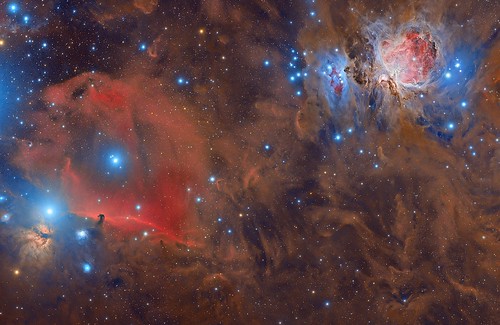 Orion HalfaRGB by Raul Villaverde, en Flickr
Orion HalfaRGB by Raul Villaverde, en Flickr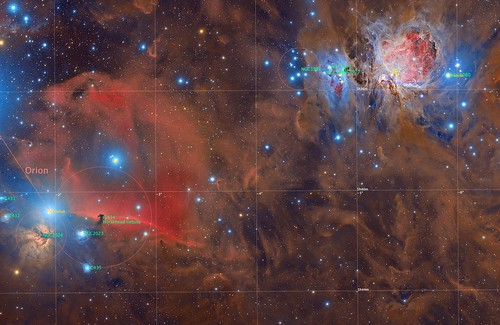 Orion_HalfaRGBv4_Annotatedv2 by Raul Villaverde, en Flickr
Orion_HalfaRGBv4_Annotatedv2 by Raul Villaverde, en Flickr
 Orion HalfaRGB by Raul Villaverde, en Flickr
Orion HalfaRGB by Raul Villaverde, en Flickr Orion_HalfaRGBv4_Annotatedv2 by Raul Villaverde, en Flickr
Orion_HalfaRGBv4_Annotatedv2 by Raul Villaverde, en FlickrRe: Submission: 2018 December
Molecular Clouds in Cepheus: MBM 163, 164, 165 & 166 and LBN 569
http://www.mauricetoet.nl
Copyright: Maurice Toet
Rarely imaged Molecular Clouds in Cepheus: MBM 163, 164, 165 & 166 and LBN 569 (reprocessed).
MBM is an abbreviation for Magnani, Blitz and Mundy who identified/catalogued 57 molecular clouds at high galactic latitudes in 1985.
https://www.mauricetoet.nl/DeepSky/i-5Z9v6J4/A
http://www.mauricetoet.nl
Copyright: Maurice Toet
Rarely imaged Molecular Clouds in Cepheus: MBM 163, 164, 165 & 166 and LBN 569 (reprocessed).
MBM is an abbreviation for Magnani, Blitz and Mundy who identified/catalogued 57 molecular clouds at high galactic latitudes in 1985.
https://www.mauricetoet.nl/DeepSky/i-5Z9v6J4/A
-
astronut2007
- Ensign
- Posts: 41
- Joined: Thu Feb 02, 2012 1:07 pm
Re: Submission: 2018 December
CHRISTMAS STAR?
Copyright: Alan C Tough
Although it looks like a Christmas ornament here, Canopus (Alpha Carinae) is the second brightest star in the night sky and is, arguably, a candidate for the fabled Star of Bethlehem.
Details:
iTelescope T27, Siding Spring Observatory, New South Wales, Australia.
Planewave 27" CDK @ f/6.6, FLI PL09000 CCD, Planewave Alt/Az mount.
Astrodon filters. LRGB = 60 Seconds per filter.
FOV: 27.1 x 27.1 arc-mins.
Highest resolution image here:
https://www.flickr.com/photos/7776810@N07/22964923944/
Copyright: Alan C Tough
Although it looks like a Christmas ornament here, Canopus (Alpha Carinae) is the second brightest star in the night sky and is, arguably, a candidate for the fabled Star of Bethlehem.
Details:
iTelescope T27, Siding Spring Observatory, New South Wales, Australia.
Planewave 27" CDK @ f/6.6, FLI PL09000 CCD, Planewave Alt/Az mount.
Astrodon filters. LRGB = 60 Seconds per filter.
FOV: 27.1 x 27.1 arc-mins.
Highest resolution image here:
https://www.flickr.com/photos/7776810@N07/22964923944/
-
cosmicwreckingball
- Ensign
- Posts: 31
- Joined: Tue May 26, 2015 2:57 pm
- AKA: Matt Harbison
- Location: Chattanooga, TN
- Contact:
Re: Submission: 2018 December
The California Nebula (NGC 1499) illuminated by the runaway star, Menkib.
This three panel mosaic reveals the California Nebula, roughly 1000 light years from our Solar System. Featured in many photos of this month's comet, 46p as it passed through Perseus, this up close mosaic of the nebula reveals it's subtle hydrogen clouds filled with stars and hiding galaxies behind the wispy clouds.
Image for submission:
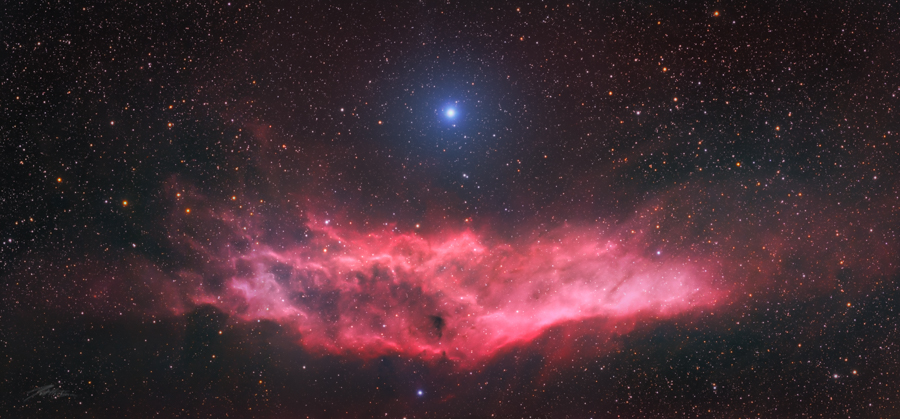
Full solve of region:
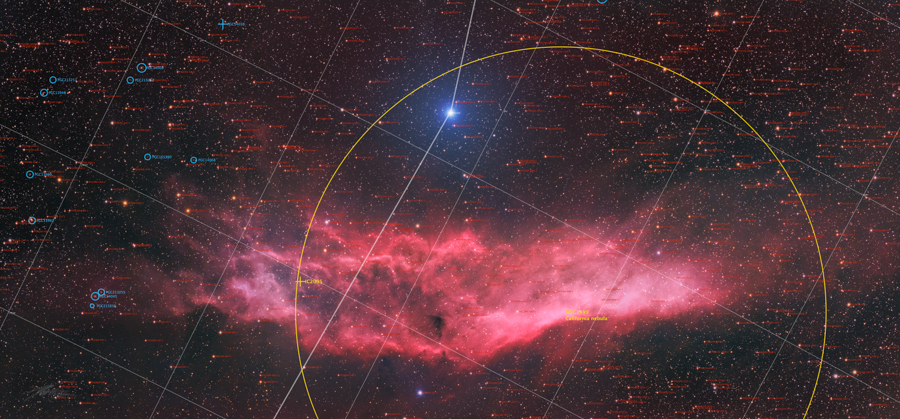
Photographed by Matt Harbison
Image captured during the months of November & December from Marathon Texas at the privately owned and operated Marathon Astronomical Remote Imaging Observatory.
Equipment used:
William Optics 132Flt with .8 reducers operating at 740fl @f5.6
QHY 16200 7 Position Filter Wheel
Astrodon Filters LRGB+HA
Astro-Physics Mach 1 GTO
QHY Med. OAG
Software used:
Captured with Sequence Generator Pro from Main Sequence Software
Edited in Pixinsight
Export & Levels in Photoshop & Lightroom
Please click for Full Resolution & Technical details: http://www.astrobin.com/380450/?nc=user
This three panel mosaic reveals the California Nebula, roughly 1000 light years from our Solar System. Featured in many photos of this month's comet, 46p as it passed through Perseus, this up close mosaic of the nebula reveals it's subtle hydrogen clouds filled with stars and hiding galaxies behind the wispy clouds.
Image for submission:

Full solve of region:

Photographed by Matt Harbison
Image captured during the months of November & December from Marathon Texas at the privately owned and operated Marathon Astronomical Remote Imaging Observatory.
Equipment used:
William Optics 132Flt with .8 reducers operating at 740fl @f5.6
QHY 16200 7 Position Filter Wheel
Astrodon Filters LRGB+HA
Astro-Physics Mach 1 GTO
QHY Med. OAG
Software used:
Captured with Sequence Generator Pro from Main Sequence Software
Edited in Pixinsight
Export & Levels in Photoshop & Lightroom
Please click for Full Resolution & Technical details: http://www.astrobin.com/380450/?nc=user
Matt Harbison
President Emeritus, Barnard Astronomical Society of Chattanooga
Cameras, Binoculars, Dobs, Cats, and Refractors. Whatever it takes!
President Emeritus, Barnard Astronomical Society of Chattanooga
Cameras, Binoculars, Dobs, Cats, and Refractors. Whatever it takes!
Re: Submission: 2018 December
I love your full resolution annotated image! Thanks!cosmicwreckingball wrote: ↑Sat Dec 22, 2018 4:30 pm The California Nebula (NGC 1499) illuminated by the runaway star, Menkib.
This three panel mosaic reveals the California Nebula, roughly 1000 light years from our Solar System. Featured in many photos of this month's comet, 46p as it passed through Perseus, this up close mosaic of the nebula reveals it's subtle hydrogen clouds filled with stars and hiding galaxies behind the wispy clouds.
Image for submission:
Full solve of region:
Photographed by Matt Harbison
Image captured during the months of November & December from Marathon Texas at the privately owned and operated Marathon Astronomical Remote Imaging Observatory.
Equipment used:
William Optics 132Flt with .8 reducers operating at 740fl @f5.6
QHY 16200 7 Position Filter Wheel
Astrodon Filters LRGB+HA
Astro-Physics Mach 1 GTO
QHY Med. OAG
Software used:
Captured with Sequence Generator Pro from Main Sequence Software
Edited in Pixinsight
Export & Levels in Photoshop & Lightroom
Please click for Full Resolution & Technical details: http://www.astrobin.com/380450/?nc=user
Ann
Color Commentator
-
cosmicwreckingball
- Ensign
- Posts: 31
- Joined: Tue May 26, 2015 2:57 pm
- AKA: Matt Harbison
- Location: Chattanooga, TN
- Contact:
Re: Submission: 2018 December
Thanks, Ann!
Matt Harbison
President Emeritus, Barnard Astronomical Society of Chattanooga
Cameras, Binoculars, Dobs, Cats, and Refractors. Whatever it takes!
President Emeritus, Barnard Astronomical Society of Chattanooga
Cameras, Binoculars, Dobs, Cats, and Refractors. Whatever it takes!
-
barretosmed
- Science Officer
- Posts: 486
- Joined: Thu Oct 12, 2017 6:04 pm
Re: Submission: 2018 December
Dear friends, I leave here in advance my sincere merry Christmas to all.
I anticipate my merry Christmas, so I made through the junction of two images my astronomical Christmas tree.
Here in this image times:
1) cone nebula (Christmas tree): captured during the meeting in Mato Grosso- MT - Brazil : https://www.astrobin.com/full/332122/0/
2) Comet 46p / Wirtaner (would be the light at the tip of the star, captured um Jales - SP - Brazil https://www.astrobin.com/full/381842/0/
Some artificial spikes were placed to simulate Christmas balls.
Equipment
1) cone: Apo 80mm ts + cen60ec + asi1600mm + baader LRGB
20 * 150 "GB + 10 * 300" halpha + L
2) Comet 46p: Canon 6D + lens 200mm f2.8 +smarteq: 15 * 60 "
Copyright: Fernando Oliveira de Menezes
Re: Submission: 2018 December
A twisted Geminid meteor
This picture captured on the way to Mt.Siguniang scenery during the Geminid meteor shower.A Geminid meteor taking a twisting path just flies over The Youngest Girls's Peak which is higher than 6200 meters.No one is sure why meteor path becomes twisted,Juergen Rendtel guesses the reason could be the meteor is markedly non-spherical in shape, non-uniform in composition, or electrically charged. Non-uniform meteors, for example, may evaporate more on one side than another, causing a rotating meteor to wobble.
Copyright: Ji Liao , Chang Liu
This picture captured on the way to Mt.Siguniang scenery during the Geminid meteor shower.A Geminid meteor taking a twisting path just flies over The Youngest Girls's Peak which is higher than 6200 meters.No one is sure why meteor path becomes twisted,Juergen Rendtel guesses the reason could be the meteor is markedly non-spherical in shape, non-uniform in composition, or electrically charged. Non-uniform meteors, for example, may evaporate more on one side than another, causing a rotating meteor to wobble.
Copyright: Ji Liao , Chang Liu






